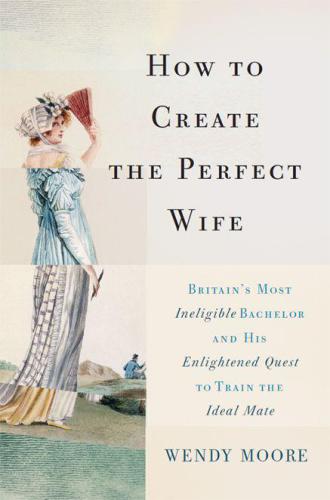
How to Create the Perfect Wife
Britain's Most Ineligible Bachelor and his Enlightened Quest to Train the Ideal Mate
کتاب های مرتبط
- اطلاعات
- نقد و بررسی
- دیدگاه کاربران
نقد و بررسی

Starred review from February 11, 2013
Enlightenment ideals become weapons in the battle of the sexes in this riotous saga of ill-starred romance. Journalist Moore (Wedlock) recounts the bizarre marriage project of Thomas Day, an 18th-century radical whose disdain for grooming, fashion, polite society, and female agency led to a string of rebuffed proposals and broken engagements. Taking a page from Rousseau’s Émile, he procured two tween-aged orphan girls with the object of teaching one to be his contradictory ideal of a wife: virginal, modest, stoically tough (he used hot wax and pistol shots to inure his star pupil to pain and fear), content to be his drudge in an isolated rural hovel, yet intellectually sophisticated enough to admire his progressive notions of freedom and autonomy. Moore sets Day’s mad pedagogy amid a droll account of his upper-class circle and their chaotic love lives, in which passions are advanced and thwarted through curlicued social niceties. Moore’s funny, psychologically rich narrative feels as if Jane Austen had reworked Shaw’s Pygmalion into a Gothic-inflected comedy of manners, and illuminates the era’s confusions about nature and nurture, sentiment and rationalism, love and power. The result is both a scintillating read and compelling social history. Illus. Agent: Patrick Walsh, Conville and Walsh Literary Agency (U.K.).

Starred review from January 15, 2013
The award-winning author of The Knife Man (2005) returns with a true-life, truly bizarre tale set in Georgian England. Thomas Day (1748-1789) had numerous virtues: He supported the American Revolution, opposed slavery, believed in living meanly to support those in need, abhorred social conventions, and wrote best-selling poetry and children's books. But as Moore shows us in this often shocking tale, Day was, in contemporary parlance, a creep--a man who took into his keeping two young girls whom he raised in a sort of sick competition to see which one would become his bride. Such behavior today, of course, would land him in prison for a lengthy sojourn, and Moore struggles valiantly to balance her disdain for Day's soaring arrogance and male entitlement (and cruelty) with her wonder and scholarly disinterest. Day wasn't a physically prepossessing fellow, but his considerable fortune and earnest manner caused many to overlook his eccentricities. Greatly influenced by Rousseau, Day cast about for a young woman who would meet his exacting spousal standards. Seeing none, he went to a foundling hospital, where he lied to obtain the services of two pre-pubescent girls, whom he named Sabrina and Lucretia. He tutored them, toughened them up with harsh physical training and raised them to be ideal partners for him (his intellectual equals, but also his servants). Day eventually sent Lucretia packing and invested all in Sabrina. It didn't work out. Both eventually married other partners (and were more or less happy), and Sabrina ended up closely allied with the family of writer Fanny Burney. Her odd story found its way into writings by Burney, Trollope, Henry James and others. A darkly enlightening tale--thoroughly researched, gracefully written--about Enlightenment thought, male arrogance and the magic of successful matrimony.
COPYRIGHT(2013) Kirkus Reviews, ALL RIGHTS RESERVED.

Starred review from March 15, 2013
This is a seductive book. Readers will be captivated as the tale unfolds, marveling at the many layers of meaning and historical significance that London journalist Moore has woven together through painstaking archival research. Thomas Day was an 18th-century British philosopher, freethinker, antislavery advocate, and pioneering children's author. Inspired by the Enlightenment and the educational philosophies of Rousseau, Day embarked on an experiment to mold the perfect wife for himself by controlling his chosen partner's education and upbringing from a young age. He illicitly adopted two teenage girls from a British foundling hospital and, set out to create his perfect companion. Day's scheme never worked out as intended; readers will recoil at the physical and psychological abuse to which he subjected his charges, and they will ponder the fate of women, especially poor ones, in a supposedly enlightened age. Moore places the story in the context of the eternal human fantasy of creating a perfect being, and links Day's obsession to the Pygmalion myth, popular in the 18th century. While Day's friends sought to protect his reputation after his death, the story of his strange attempt lived on in various works, including Shaw's Pygmalion. This is also the story of Sabrina Bicknell, the thrice renamed orphan whose life remained intertwined with Day's until his death. VERDICT Highly recommended to all interested in 18th- and 19th-century literature and ideas, especially Anglophiles.--Marie M. Mullaney, Caldwell Coll., NJ
Copyright 2013 Library Journal, LLC Used with permission.

March 1, 2013
Who hasn't dreamed of a perfect better half? But one eighteenth-century British philosopher attempted to make that dream come true. Moore (Wedlock, 2009) lays out the incredible true story of Thomas Day. Unable to find a spouse suited for the bare life of virtue he envisioned, Day set out to create her by taking two orphan girls and subjecting them, without their knowledge, to his wife-molding program. Moore wittily skewers Day's pie-in-the-sky ideals as they clash disastrously with reality. This engaging account will appeal to a diverse audience, including Enlightenment philosophy students and Jane Austen fans. Day is ludicrous, insufferable, arrogantand utterly engrossing. His quixotic quest fired the plots of numerous fictional works, including Pygmalion, that examined the quest for perfection. The narrative pulses forward briskly, moving between Day's story and those of the orphan girls. Drawing on detailed personal accounts, Moore creates suspense and surprise in a manner rarely achieved in biographies. An unusual and unusually fascinating story.(Reprinted with permission of Booklist, copyright 2013, American Library Association.)

























دیدگاه کاربران